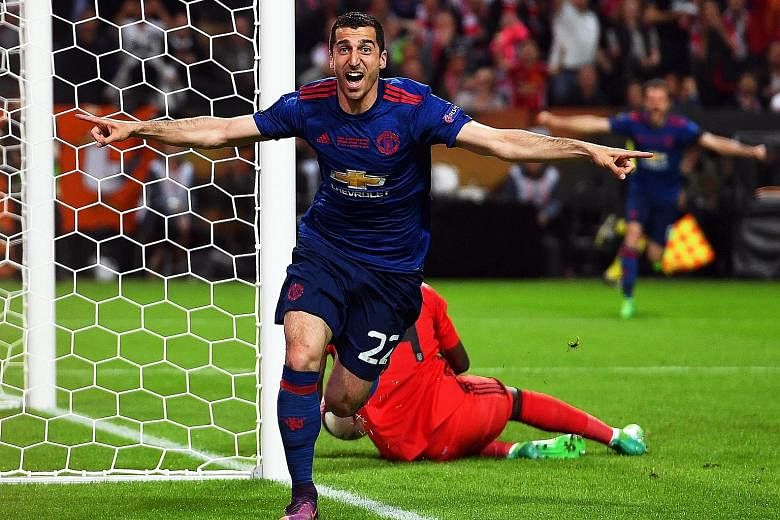LONDON • Henrikh Mkhitaryan would be forgiven for not wanting to take his work home with him. His first season in the English Premier League has, after all, been a demanding one, enough to make anyone cherish any chance at all to switch off.
There has been the battle to win a place and establish his presence at Manchester United; a collection of wonderful, occasionally gravity-defying goals once he settled in. Then, as the campaign reached its climax, a relentless workload - games piling up in great drifts, culminating in Wednesday's Europa League final against Ajax. He scored against the Dutch side in a 2-0 win.
That would be enough, but Mkhitaryan has always been one of those players who struggle to relax. Early in his career, he tended to switch off his phone for "three days before a game", so determined was he to focus on the task in hand.
Looking back, at 28, he knows that such intensity was unhealthy. He often felt "sad" for days after games, brooding over every perceived error, reproaching himself for every defeat, screening the calls of his friends and family in case he took out his frustration on them.
He is better at it now, he says, persuaded that it was counterproductive if his "muscles were tense all the time", but even now it remains a deliberate thing, requiring a conscious effort. He finds it hard to take it easy.
He tries, actively, to take his mind off football as much as he can. Mkhitaryan has a regular supper club with his team-mates Zlatan Ibrahimovic and Paul Pogba. He goes to the movies as often as time allows. He seeks distraction so he might focus better when needed.
He makes just one exception. No matter how draining his week, Mkhitaryan, the £26.3 million (S$46.5 million) forward, always spends hours on YouTube watching grainy coverage of dubious-quality football from his native Armenia.
He does not do it for pleasure, particularly. The standard is not a patch on what he experiences in England, even in training. Because there are only six teams in Armenia's highest league, he admits he finds the games a little repetitive.
He does it partly out of loyalty, to Pyunik, the team where he first made his name, and to his friends still playing in his homeland. Mainly, though, he does it because no matter where he is or who he has become, a little bit of Mkhitaryan is always in Armenia, at home.
It is eight years now since Mkhitaryan left. In the intervening years, he has played for four clubs - Metalurh and Shakhtar Donetsk, in Ukraine; Borussia Dortmund in Germany; and now United. In between, he has also picked up four languages (English, German, Russian and Ukrainian) to add to the three he already spoke (Armenian, French and Portuguese).
He has travelled thousands of miles. His journey has been long and often lonely.
In retrospect, of course, it has all been worth it. Mkhitaryan already ranks as the finest player his country has produced, and he is the first Armenian to win a major European trophy.
He also likes playing the part of ambassador for his country and says that the victory against Ajax has not just provided him with a medal, but would give others the chance "to find out what Armenia is, where it is".
He is proud that he is, if not the world's most famous Armenian, then at least a standard-bearer for his homeland on the world stage.
Mkhitaryan is one of only a current handful of players from the former Soviet states at one of the biggest teams in one of Europe's elite leagues. Bundesliga side Schalke's Ukrainian winger, Yevhen Konoplyanka, is the only other active player he can name.
A region that was once a hotbed for talent, to Western eyes, from Andriy Shevchenko to Kakha Kaladze, has all but dried up.
Many English clubs contend it is too hard to scout in Russia and Ukraine because the standard of teams varies so widely.
Scouring for gems in a place like Armenia would not even occur to them.
"No scouts come to Armenia," Mkhitaryan said. "And in Russia and Ukraine, the players prefer to stay there, not to come to Europe and develop as footballers."
Mkhitaryan is the exception. He has made it out, as far as he could have ever dreamt of going. He has not, though, forgotten where it started. He still watches, even now, for that little taste of home.
NYTIMES

